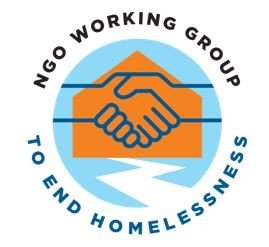Mission
Our mission to advocate at the United Nations for persons who are vulnerable, pursuing the human right to adequate housing for all and to end homelessness, so that all people can realize their full human rights and potential, and flourish. Our vision is a future in which every person experiences the dignity of having a safe, habitable, affordable, secure home achieved through social protection / advocacy at the United Nations, safeguarding human rights, and supportive, sensitive policies and programs to end homelessness.
An essential aspect of the WGEH is our inclusion of the voice of people who have experienced homelessness and housing insecurity.
History
The NGO Working Group to End Homelessness (WGEH) was officially established in November 2017 as a collaboration between several ECOSOC-accredited United Nations NGOs. Since its founding, WGEH has grown and evolved from this small membership of only 6 organizations to comprise a total of 31 member organizations.
WGEH was founded with the mission to advocate at the United Nations for persons who are vulnerable, pursuing the human right to adequate housing for all and to end homelessness, so that all people can realize their full human rights and potential, and flourish. In this advocacy work, the working group partners with a variety of member states, UN agencies, NGOs, committees, and organizations.
Together with these partners, the working group has been successful in advancing its mission during its short, nearly four-year history. Since the creation of the working group, for example, homelessness has been the subject of many side events at CSocD sessions, the Commission on the Status of Women, and the ECOSOC Youth Forum, observances of World Homelessness Day, and more. The working group has also been represented at various seminars and meetings, including the May 2019 Nairobi Expert Group Meeting on homelessness in preparation for the 58th Session of the Commission on Social Development (CsocD58), as well as on the Habitat Civil Society Working Group.An essential aspect of the WGEH is our inclusion of the voice of people who have experienced homelessness and housing insecurity.

